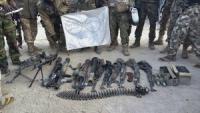-
Clear guidelines needed for “Stingray” devices: Congressional panel
The House Oversight and Government Reform Committee the other day released a bipartisan staff report after a yearlong investigation into federal, state, and local law enforcement use of cell-site simulators – devices that transform a cell phone into a real-time tracking device. The report finds these law enforcement agencies have varying policies for the use of these powerful devices. As a result, the report recommends Congress pass legislation to establish a clear, nationwide framework that ensures the privacy of all Americans are adequately protected.
-
-
New incident management planning tool for first responders
A suspicious package is found in a public park. An unattended bag is found by a trash can at the metro or a street corner. A person with a weapon is reported at a school or mall or other public location. Unfortunately, these are not uncommon occurrences, and responder agencies – from small towns to big cities – must all know how to respond and work together. That requires training, technology, tools, and time. The Department of Homeland Security Science and Technology Directorate (S&T) Explosives Division (EXD) has a solution.
-
-
May 2012 North Korean seismic event an earthquake, not nuclear test
A tiny seismic event that occurred in North Korea on 12 May 2010 appears to have been an earthquake rather than a small underground nuclear explosion, according to a new analysis. The new study contradicts the findings of a 2015 report which concluded that the magnitude 1.5 seismic 12 May event was a small nuclear explosion.
-
-
Is Iran cooperating with North Korea on a nuclear weapon?
Spurred by a letter written by Sen. Ted Cruz (R–Texas) to three senior Obama administration officials, investigative journalist Claudia Rosett on Thursday examined the possibility that Iran and North Korea are collaborating on nuclear weapons research in the wake of last year’s nuclear deal. Rosset explained that the two nations have a history of collaborating on weapons development. Usually, North Korea undertakes much of the development while Iran that foots the bill, with technicians traveling back and forth between the countries.
-
-
With proliferation of small arms, absence of war does not equal peace

The proliferation of small arms across many regions of Africa affected by conflict – or adjacent to chronic conflicts – have brought misery, but it has also provided a means for lawless groups to supplement the meagre rewards of nomadic pastoralism through raiding or other forms of violence. Governments in conflict or former conflict zones often have vested interests in maintaining informal armed groups beyond the army and other state security forces — for the entrenchment of political elites, the garnering of rents through armed extortion, or as potential weapons against hostile neighbors. The over-arching problem, according to one researcher, is that “Ending the war is not enough. The issue is to escape the inter-war situation maintained and reproduced by the state.”
-
-
1,900 arrest-related deaths in U.S. between June 2015-May 2016: Study
The Bureau of Justice Statistics (BJS) Arrest-Related Deaths program estimates that there were 1,900 arrest-related deaths in the United States between June 2015-May 2016. These deaths include all persons who died during the process of arrest or while in police custody, including deaths due to homicide, justifiable homicide by a law enforcement officer, suicide, accidental injury, and natural causes.
-
-
Firefighters to have bushfire predictions at the fingertips
Researchers at the University of Western Australia are developing a new touchscreen device that can be mounted in a fire truck to help firefighters predict where and when a bushfire will spread. The researchers are modifying bushfire simulation software Australis into a high-end tablet to provide accurate predictions of fire behavior more rapidly than current methods.
-
-
Syrian opposition: Israeli airstrike hit chemical weapons intended for Hezbollah

An Israeli air raid on a depot controlled by the Syrian regime two weeks ago hit a supply of chemical weapons being transferred to the Iran-backed terror group Hezbollah, a spokesperson for a Syrian opposition group said Sunday. Israeli Defense Minister Avigdor Liberman obliquely suggested last week that Israel was responsible for the strike and that the target had been Hezbollah-bound chemical weapons; other Israeli leaders have made it clear in public statements and conversations with foreign leaders that they will act to prevent Hezbollah from acquiring “game-changing” weapons or strengthening its positions on Israel’s borders.
-
-
Identifying, fast-tracking development of first responders technology
First responders face challenging conditions while often carrying heavy and outdated equipment. Wearable technology is on the rise, estimated at a $10 billion dollar commercial market, and advances are happening in the health and fitness area every day. The first responder community stands to benefit from integrating some of this otherwise heavy and outdated equipment into wearable technology, improving both upon efficiencies and responsiveness as well as continuing to prioritize their own safety on the frontlines of often dangerous situations.
-
-
Game platform to help in preparing for strategic surprise
National security challenges today are increasingly complex and multi-dimensional, demanding technological solutions that reflect the combined expertise of a broad diversity of professionals. But even when such experts are available and engaged, progress towards an integrated solution can be slowed by the lack of a versatile, domain-agnostic, collaborative platform, where innovation can happen not just despite but because of the disparate mix of participants’ perspectives and experiences. DARPA aims to link global experts from varied disciplines via gaming platform to speed the application of emerging science and technology.
-
-
Israeli defense minister suggests Hezbollah was smuggling chemical weapons
Israel is working hard to keep chemical weapons out of the hands of the Iran-backed terror group Hezbollah, Israeli Defense Minister Avigdor Liberman told a Knesset committee Thursday. His comments to the Knesset seemed to suggest that at least one of the strikes Israel carried out the same day at the Mazzeh military airport near Damascus was in order to stop Hezbollah from acquiring chemical weapons.
-
-
$19 million to develop drugs to treat victims of chemical weapons attacks
First used by the German military against Allied troops in the First World War and in subsequent wars including the Iran-Iraq conflict during the 1980s, chemical weapons were more recently used by the Assad regime in Syria and by ISIS in Iraq and Syria. The National Institutes of Health (NIH) has awarded Rutgers University a five-year grant for more than $19 million for research that would lead to the development of drugs to treat toxicity from chemical agents used in a terrorist attack.
-
-
Swarming robots to help small urban ground units
Urban canyons — with their high vertical structures, tight spaces, and limited lines of sight — constrain military communications, mobility, and tactics in the best of times. These challenges become even more daunting when U.S. forces are in areas they do not control — where they can’t rely on supply chains, infrastructure, and previous knowledge of local conditions and potential threats. to help overcome these challenges and increase the effectiveness of small-unit combat forces operating in urban environments, DARPA has launched its new OFFensive Swarm-Enabled Tactics (OFFSET) program. OFFSET seeks to develop and demonstrate 100+ operationally relevant swarm tactics that could be used by groups of unmanned air and/or ground systems numbering more than 100 robots.
-
-
Purdue launches Institute for Global Security and Defense Innovation
Purdue University president Mitch Daniels announced last Thursday that the university is opening a new Institute for Global Security and Defense Innovation in Discovery Park. In the 2016 fiscal year, the university was awarded more than $50 million for advanced defense-related research projects. The new institute will centralize defense and security research efforts across campus, and, it is hoped, will make Purdue the pre-eminent university in national defense and security. “We can no longer rely on decades of military superiority via so-called technology ‘off-sets,’” said Tomás Díaz de la Rubia, chief scientist and executive director of Purdue’s Discovery Park. “In the future we must out-invent, out-discover, and out-innovate our adversaries every day.”
-
-
A license to print: how real is the risk posed by 3D printed guns?
3D printed guns are back in the news after Queensland Police reported last week that they had discovered a 3D printer in a raid on what appeared to be a “large-scale” weapons production facility as a part of Operation Oscar Quantum. But the fact is that 3D printing technology is not yet at the stage where it can readily produce weapons. Although it can be used to help rogue gunsmiths work their shady trade. And we should remember that it’s not only 3D printing that enables people to build illicit firearms. With the right tools, a skilled gunsmith can make a weapon in their back shed. However, 3D printing can make that process easier and more accessible to less skilled individuals.
-
More headlines
The long view
Factories First: Winning the Drone War Before It Starts
Wars are won by factories before they are won on the battlefield,Martin C. Feldmann writes, noting that the United States lacks the manufacturing depth for the coming drone age. Rectifying this situation “will take far more than procurement tweaks,” Feldmann writes. “It demands a national-level, wartime-scale industrial mobilization.”
How Male Grievance Fuels Radicalization and Extremist Violence
Social extremism is evolving in reach and form. While traditional racial supremacy ideologies remain, contemporary movements are now often fueled by something more personal and emotionally resonant: male grievance.
The Surprising Reasons Floods and Other Disasters Are Deadlier at Night
It’s not just that it’s dark and people are asleep. Urban sprawl, confirmation bias, and other factors can play a role.
Why Flash Flood Warnings Will Continue to Go Unheeded
Experts say local education and community support are key to conveying risk.
